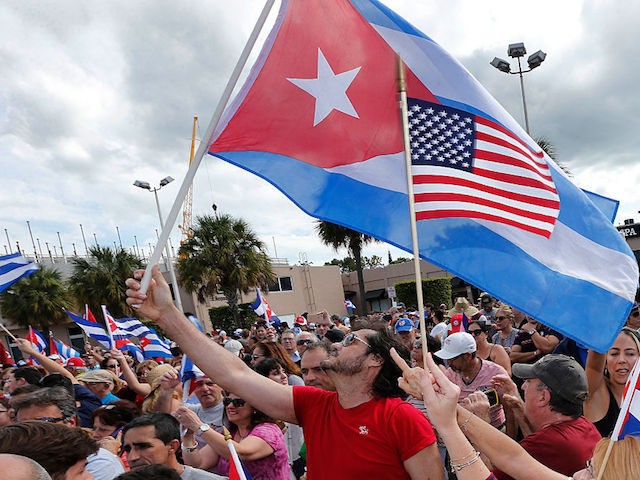The Department of Homeland Security publicly posted the names and personal information of 46 Cuban refugees who had requested protection from America out of fear of persecution at home, the Los Angeles Times reported on Monday, tipping off the communist Castro regime.
The Cuban citizens — whose names, birthdates, nationalities, and respective detention centers were reportedly publicly posted by Homeland Security – feared persecution and torture. The Los Angeles Times claimed the publication of their identities was accidental.
The 46 Cubans affected are part of a larger group of 103 Cubans that Homeland Security had scheduled for deportation via airplane after the Biden administration and the Castro regime agreed to resume deportation flights in November. Washington had halted the flights in response to the Chinese coronavirus pandemic.
The leak occurred on November 28 when Immigration and Customs Enforcement (ICE) “accidentally” posted a lengthy list online containing sensitive information about 6,252 asylum seekers that the agency holds in its custody.
ICE appeared to confirm the publication.
“Upon notification, U.S. Immigration and Customs Enforcement took swift action to immediately rectify the error,” ICE said in a statement. “Though unintentional, this release of information is a breach of policy and the agency is investigating the incident and taking all corrective actions necessary. ICE is notifying noncitizens impacted by the disclosure.”
According to the Los Angeles Times, ICE officials will now not deport those affected for at least 30 days so that the asylum seekers can determine if the publication of their personal information will affect their respective cases. U.S. authorities are reportedly scrambling to foreclose the possibility that the Castro regime could retaliate against the 46 Cuban citizens whose information was publicly posted online.
Ramón Saúl Sánchez, head of the Cuban exiles non-profit organization Movimiento Democracia, told Radio Television Marti that the leak could be “a long prison sentence for any of the Cubans who applied for asylum confident that their information would remain closed to the Cuban regime.”
Cuba’s migrant crisis has dramatically worsened throughout 2022 as more Cubans continue to desperately flee from communism in record numbers.
U.S. border officials announced in October that they registered 220,908 Cubans during fiscal year 2022, a number higher than the 187,716 Venezuelans and 163,876 Nicaraguans fleeing from their respective socialist regimes documented during that year. Panamanian authorities informed the public on Monday that the number of Cubans crossing the dangerous Darien Gap, located between Colombia and Panama, had increased fivefold during 2022.
The Castro regime has also increased its brutal repression against the nation’s citizens, who have continuously protested demanding an end to over six decades of communist rule in Cuba.
Throughout the year, the communist regime has arrested and beaten minors, punished political prisoners who refuse to undergo “ideological rehabilitation” and turn loyal to communism, and rammed a boat to prevent a group of Cuban citizens from fleeing, killing four adults and a two-year-old in the process.
In addition to severe shortages of food and medicine, Cuban citizens have had to undergo near-endless power blackouts as a consequence of the nation’s collapsing electric grid. The Castro regime admitted last week that it preferred to divert resources towards the development of their dubious “Soberana” and “Abdala” Chinese coronavirus vaccines over repairing the island nation’s obsolete power grid.
The Biden administration continues to swiftly detain and deport Cuban refugees fleeing from communism, with a special focus on Cuban balseros or “rafters,” who attempt to reach U.S. soil by making a dangerous sea trip using boats or makeshift rafts. Unlike those attempting to cross the U.S. southern border, balseros are not beholden to human trafficking operations run by Mexican cartels and other criminals throughout Central America.
As Cuban citizens settle in other countries, they begin to send remittances to their friends and families still living in Cuba — which the communist Castro regime has turned into a significant source of its revenue.
According to a report published by the Miami-based Havana Consulting Group (THCG) in 2020, the Castro regime pockets 74.3 percent of every United States dollar sent to Cuba via remittances, with a sheer majority coming from the United States. The Castro regime, after pocketing its large cut, gives the remainder to the intended recipients of the foreign currency in the form of the highly controlled Cuban pesos.
A report published in March by Voice of America found that, according to the Havana Consulting Group, Cuba received $3.1 billion in remittances in 2019. In an effort to curb the flow of cash, the Trump administration imposed strict restrictions on remittances sent to Cuba at the time, which reduced the amount Cuba received via remittances down to $1.08 billion in 2021.
The Biden administration loosened many of these restrictions in May 2022.
Christian K. Caruzo is a Venezuelan writer and documents life under socialism. You can follow him on Twitter here.

COMMENTS
Please let us know if you're having issues with commenting.